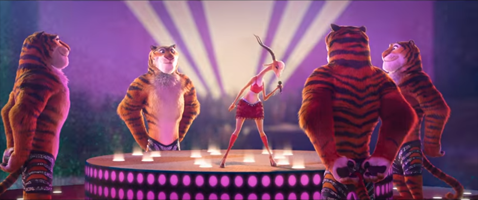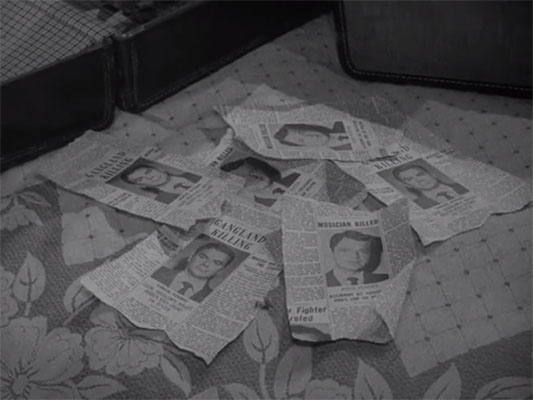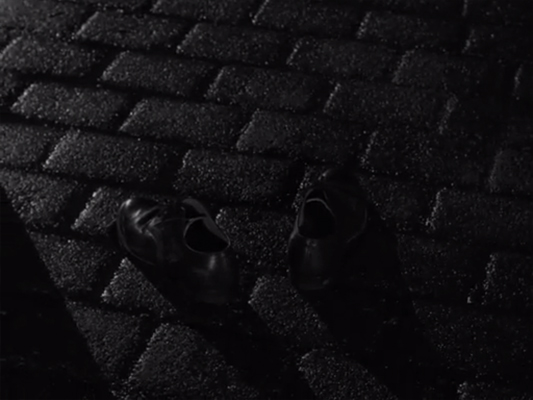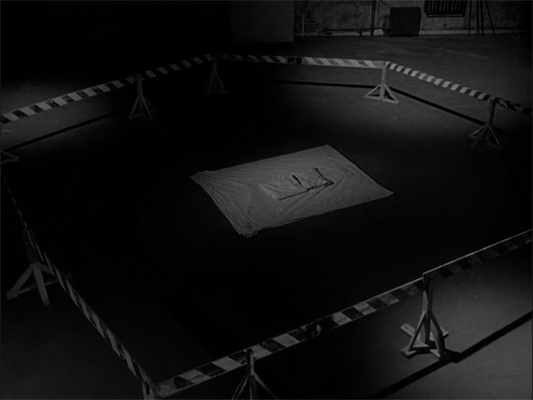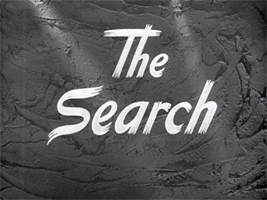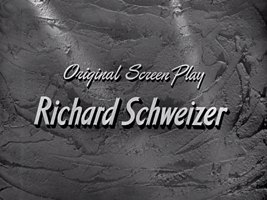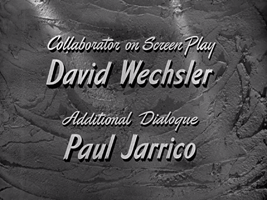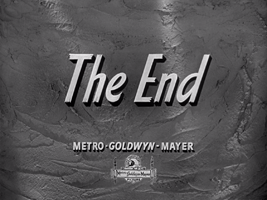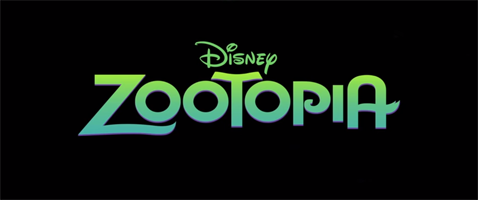
[This screenshot and the one at the bottom of the page are from the trailer, not the actual film. They’ll be replaced whenever the next entry in this series goes up. (The Big Hero 6 placeholder images have just now been upgraded to the real thing.)]
Full spoilers (and other kinds of spoilage) throughout. The reader is firmly advised to have seen Zootopia — now in theaters — before proceeding.
ADAM I thought that was high-class all the way. Solid quality, and pleasing. I’m happy to elaborate on that.
BETH I also liked it very much. I don’t know where I’m landing in terms of how it falls in the canon, but I was really into it. Those are my opening thoughts; we will all elaborate.
BROOM I had a very complicated reaction; I’m not sure I can make a one-sentence opening statement. I wanted to hash it out in conversation. I don’t know what it adds up to in one sentence. And maybe no reaction to a movie is really one sentence. So I’m not going to fake like I have one sentence.
ADAM That’s interesting, because I felt uniformly positively about it. I thought the characters were compelling and inspirational without being one-note, and I thought it was appropriately subtly topical, and it was really beautiful to look at and had a lot of imaginative jokes on the main theme. And I also think that a detective story was a good peg to hang it on, because everyone can find a detective story engaging for two hours, even kids. It wasn’t too complicated for kids to follow but it wasn’t insultingly straightforward either. It was more interesting than just “little girl moves to the big city.” That’s what I was afraid it was going to be, but it was more than that.
BETH Did you predict who the bad guy was?
ADAM I did only once it became clear that the predators were being framed. Because there was only one “prey” in the whole movie, other than Judy.
BROOM I guessed who it was when they got to the drug lab, and not before.
ADAM Yes, for me it was when she said “but who’s been framing all these predators?” which was right before they walked into the drug lab.
BETH I’ll just own up to not guessing. Then when I saw it who it was, I thought, “oh, duh.”
BROOM But I’m proud to say that I did guess, much earlier, that the victims were all suffering from the drug effects of the plant that she had elaborately named.
BETH I also knew it was a drug, but I didn’t put it together with the plant.
ADAM Yeah, if I had gone back and made a lineup of all of the things in the movie that we hadn’t used yet… It was pretty good about using everything it introduced. Even the sloth got reused, in a way that I found pleasing. All right, Broom, so what were your complicated feelings?
BETH Do you have ideological issues?
BROOM I guess you could frame it that way. I’m kind of surprised that you guys don’t immediately know what would be complicated about my response to this; I assumed that everyone would intuitively agree on what was complicated about this movie. But I guess not. The complication has to do with the purported topicality of it — the messaging of it — as it relates to the premise of the anthropomorphic world. Which is not a premise they invented for this movie, it’s a longstanding premise. They tried to both interrogate it and its metaphors, and also keep running with it. I didn’t know how to reconcile — and I was hoping to try to work this out now, unless it’s a just waste of your time because you really didn’t have any of these issues — but I didn’t know how to reconcile the message of it —
ADAM The message being “We are more than our biological origins, and you can be anything you want when you grow up, and don’t stereotype”?
BROOM Yeah, more or less. I took the message of it just to be a standard contemporary anti-bigotry message, as you’d find in any number of editorials and medium.com essays.
ADAM All right, so, on the one hand…
BROOM Well, wait, before we dig into “what Broom thought” — You personally did not have issues in this direction? It really worked for you, or you didn’t “go there,” or… ?
ADAM Well, yeah — though I’m not saying that I’m going to disagree with your view once you articulate it.
BROOM Yeah, but I think that an unarticulated ease with something should usually be left intact. I don’t want to claim that you ought to question what you didn’t question, if it just felt right to you. The important thing is, to you, it didn’t feel like a problem? Because I didn’t come up with my problem to try to be smart; I felt uncomfortable.
ADAM No, I didn’t feel uncomfortable.
BETH I think I’m somewhere in between you. I didn’t feel uncomfortable, but it was also sort of on my mind: “What do I actually think about this?” Like when she was in the press conference saying cringeworthy things, I thought, “well, wait…” This is always my problem with movies: when I’m taken by them, when I’m wrapped up in the watching of them, I’m not really outside of them enough to talk about what I think about their ideologies. “I was just into the movie! What do you want??”
BROOM That’s why I wanted to pause the conversation before I start articulating this further. I think that if a movie worked for you, allowed you to get wrapped up in it, that means that whatever ideology we try to identify in the movie — if we identify it accurately — it’s something that your subconscious is comfortable taking on. I can say for myself that within the first five minutes of the movie — when they explained “This is how our world works: predators used to be predators, but not anymore! Now we live together!” and then they cut to different animals in an audience together, and one type of animal is being “a hick” — I just felt it, I felt immediately very uncomfortable.
BETH Because even the upending of those stereotypes — addressing them at all — is uncomfortable?
ADAM That hick fox — he gets to come back and be a pastry chef.
BROOM Again, I don’t want this to all be about the way I happen to end up expressing it… but I guess I’m really hearing that you guys didn’t have that experience at that moment. So I guess for me the issue is: we only want to watch movies where different animals are different kinds of people because that feels true about the world. And insofar as it feels true, that’s what we — from an ideological standpoint — would call “bigotry.” Now, I personally am very uncomfortable with the public rhetoric around bigotry because I think it doesn’t acknowledge the ways in which that perception of the world is natural and inevitable…
ADAM Natural and inevitable that what?
BROOM We can’t deprogram ourselves by deliberately “upending” these perceptions. Natural and inevitable that people experience other people as, essentially, different kinds of animals. A slow-moving person at the DMV seems like they’re from the slow-moving species of person. That’s a psychological reality, one that cartoons jibe with. At least for me. Do you disagree with that?
ADAM No, sure, I mean, Speedy Gonzales… But the part I’m not following is, what part of that seems uncomfortable to overlay on the way people are with each other?
BROOM Boy, so you really don’t feel it the way I do. Okay, let me see if I can formulate this…
ADAM If it’s too complicated to unpack, we don’t have to.
BROOM I can do it! I’m just reluctant to create a conversation that seems to be about the words I use to describe it, because for me it’s an intuitional thing, and I would rather you counter what I’m saying with your intuitions. But I guess your intuitions were copacetic.
ADAM My intuition was that all Disney movies have messages; in recent years they’ve all tended to be politically progressive messages. If you think about The Lion King as an early, ham-fisted politically progressive message, and then compare it to something like this…
BROOM I consider The Lion King to be the turning point, toward deliberate messaging.
ADAM But they all have deliberate messages. You know, Dumbo‘s message is “believe in yourself.”
BROOM But I think a refrain in our discussions about many of those earlier Disney movies was that while we might pick apart politically incorrect things that occur in them, probably the creators never consciously thought about those things. Those movies were a revealing of subconscious assumptions, because the artists were just using their intuitions to work out what would make a good story. There was a relative lack of deliberate philosophizing, which is exactly what allowed us to see the various stereotypes and subconscious ideologies. Whereas since The Lion King, it really feels like they run everything through a conscious censor, to make sure it makes sense, and then try to say something deliberately.
ADAM They’re not all expressly political. The message of Lilo and Stitch was “Ohana means Family, and Family means no one gets left behind,” which is not a political slogan per se. But here, what I appreciated about it was that it was a little smarter than The Lion King. The heroine has her own unexamined prejudices, and that creates problems; but she overcomes them, she’s not a bad person. And you identify with her stereotypes at the beginning, because the fox is shifty, he is a kind of con-man, but as you get to know him, it turns out not only is there a backstory that explains that, but also he’s so much more than that. It’s easy to identify with the progress of the hero, and that makes it a little more impactful. That’s why I didn’t feel uncomfortable with it. And I didn’t feel that they were essentializing any of the animals…
BROOM You didn’t? “Essentializing” is exactly the word. Why else were any of those characters assigned to those animals, if not the essentialization — racialization — geneticization — of personality traits?
ADAM But the villain was a sheep! And there was that hammy gay tiger who loved Gazelle! And —
BROOM But those are just a few foreground story-inversions of the actual operative premise of the anthropomorphic world. The whole idea of Zootopia — when we first heard about this movie two years ago, we thought, “A city of animals? That hardly even counts as a premise!” It’s just such a basic, ground-level thing, in cartoons. It goes back to Aesop. Why would we ever tell a story about a talking animal? Because certain people seem like that kind of animal. But what do we mean when we say people “seem like” an animal? We mean something very subjective, an impression, which nonetheless we might share with our whole community of peers, to whom it seems equally intuitive. Like, guess what, hicks with a Southern accent seem like they might well be a different species from me! And all my friends agree, it does kinda seem like hicks are a different species. So hey, you know what would be a great way to represent them in a cartoon: as a literally different species. That feels intuitive and satisfying. So then this movie says “We’re going to actually talk about this head-on,” but…
ADAM But for the most part, it wasn’t like all the rabbits only talked to other rabbits. I don’t think she even saw any other rabbits in the city.
BROOM I mean: what do the predators eat? — in this scenario where we’re claiming that they’re both actually and specifically predators, and not, at the same time.
ADAM They didn’t get into that I assume because it would be uncomfortable for human audiences, thinking about the sources of our food.
BROOM The metaphor is that minorities who cause fear in the majority because of stereotypes are depicted here as “predators,” but in this world they have none of the actual traits that predators have — except for the ones that are funny for throwaway jokes in the course of a scene. That all puts us in a very uncomfortable place. If we want to see each other as equals who should be treated equally, the premise of our depiction cannot be that we’re different species based on our different personalities or social roles.
ADAM I understand that, but… they were all mammals! They didn’t really get into their essential species natures. This is the first one I can think of where there was no love story, and I guess that was deliberate, because that would be a whole other level of uncomfortable conversations, if there had been any kind of sex.
BROOM How is what you just said not an expression of exactly the kind of stuff that the movie was ostensibly telling us to get beyond? Are the fox and the rabbit in the movie “just people,” who are essentially equal and can be in love? Or are they essentially different, in a “fox vs. rabbit” kind of way? In which case, what does that correspond to?
ADAM It doesn’t map on perfectly to human society, because they are essentially different, which is why there were no cross-species couples in the movie, because rabbits can’t mate with foxes.
BROOM Right.
ADAM But on the other hand, the movie’s not saying “therefore people are different species.” That’s just carrying the metaphor too far.
BROOM Then where does the metaphor end? What is the metaphor, in your mind?
ADAM The metaphor is that, like… I don’t think it does, nor did it feel to me like it — It neither intended to nor unintentionally landed on “different types of people are different species.”
BROOM You don’t think that’s the metaphor?
ADAM No. My mind didn’t go there while I was watching it.
BROOM I think your mind didn’t go there because that’s been the subconscious premise of all anthropomorphic cartoons, forever. Like, if there’s a Sidney Greenstreet character in a cartoon, the huge crime boss that you go into the back room to meet, and of course he’s a hippopotamus because hippopotamuses are really big — it works just like a caricature does, it says “Let’s admit that our response to this ‘type,’ when we talk about ‘types,’ is essentializing.” When they talk about “typecasting” in Hollywood, they’re talking about the fact that we see each other with these prejudiced eyes that are reponsive to superficial things. And a cartoon that shows such things as different kinds of animals, and has fun with it, is basically an embrace of that aspect of our nature. Which I think is good, because I’m very wary of all the rhetoric now about seeing past race. I think that you can’t deliberately see past what you are seeing, and cartoons show us that. So Zootopia was a cartoon in that spirit, that nonetheless was — on a storytelling and philosophical level — trying to say “Here’s what we’re gonna do about it.” I felt like the cartoon itself reveals why we can’t just think our way out of it, “nice” our way out of it. Here’s a cartoon where we’re watching a rabbit with big eyes getting beat up by a fox, and you can’t deny that the scene makes sense to people.
ADAM Right, but then a half hour later, you find out that the fox, when he was eight, got beat up by a bunch of rabbits.
BROOM Different fox, but yes.
ADAM And did that feel unreasonable?
BROOM That was in the context of “learning,” in a very deliberate way. That felt to me like “this one bit of the subconscious has for the moment risen into the view of the consciousness, so what do we say about it?” But we’re still surrounded by a sea of the subconscious, and the subconscious says: “the world is a city of different kinds of animals that are hilariously different from each other, and there’s a sight gag for each one.” That’s the unexamined ground-level. Then, yes, ever since The Lion King, there’s also this additional conscious element that purports to be an examination of it.
BETH I’m trying to think about how I would see it if I were a child, what I would take away from it. And I originally was angry with the parents for being so — you know: “We can’t expand our boundaries. Learn to be complacent; that’s the way to have a happy life.” I think rejecting that has been a message in Disney movies all along: “Push your boundaries! See what you can be! You can do anything!”
ADAM “I wanna see what’s over that ridge!”
BROOM Yeah, or as the lyric had it in this movie, “I wanna try everything!”
BETH And I think that’s a good message. And I like how it kept showing that she was put in these fear-inducing situations and refused to succumb to them. The race stuff is more complicated. Because I think what it wants me to take away — which is sort of what Sesame Street wanted me to take away — is that the world is made up of all different types of people, all different types of creatures, and you don’t necessarily know anything about them just by looking at them. You have to spend time with everyone and get to know them. And I think that’s what it was trying to say. You can’t make a judgment before you know what someone is about. Very basic kids’ stuff, but not at all offensive, I think. It’s not like I’m not hearing what you guys are saying, but I think — as far as messaging goes — it did it with a pretty light touch, in an unobjectionable way.
ADAM Yeah, I didn’t come away thinking “Idris Elba is a water buffalo with whom I cannot mate.” Although I get what you’re saying. It hadn’t occurred to me to think about it in those terms, but.
BROOM So, during the pivotal press conference scene, when she says, “well, there might be a biological component…”
BETH I wanted her to say “This is just what I heard the doctor say in the lab!”
ADAM That was pretty negligent of her.
BROOM I think they tried to introduce that she’s frazzled by the situation so she’s just reaching for things to say.
BETH Yeah. I wanted that to be more explicit, for my own child- empathy reasons.
BROOM I could see a whole story conference playing out, about how to set up that beat. But did you not at any point think, “Well, I don’t know what the rules of this world are! For all we know, the thing she’s saying could be true!” Because it’s not a question of any real principle, it’s just up to the Lords Of Disney, the writers who made up this fantasy story. Our faith — that these predators aren’t actually reverting to their original predator-nature — is purely a political-correctness faith. Because as far as anthropomorphic animals go…
ADAM But it was also set up by the whole movie. By the logic of the story — we’d been told at the very outset that predators and prey had overcome their tendencies…
BROOM Yeah: how and by what means? Total magic! We have no idea!
ADAM Right, but we already knew that was part of the internal logic —
BROOM So at this point in the story we’re challenged to have faith in that, a thing which has been completely glossed over…
ADAM It was obvious that Emmett Otter hadn’t suddenly turned into a bad person. That’s why they made him seem so meek.
BETH Yeah, I think that’s why they used Emmett Otter as the primary case.
ADAM Do otters eat meat? I don’t even know what otters eat. I guess so.
BETH Fish, I thought.
ADAM I guess that makes you a predator. There were no fish in this movie. Well, it is a mammal city.
BROOM I felt like they were very much in “The Bell Curve” territory here. The character says, “Well, if the science shows it…” and we the audience are supposed to be shouting “NO! No, the science would never show that!” And it has nothing to do with the movie — there’s no actual science to evaluate here — it just has to do with our political anxiety that it could turn out that way. Which in this particular movie…
ADAM But it was flatly refuted by this movie.
BROOM In The Three Little Pigs, guess what! The wolf is a dangerous wolf! That’s also a cartoon with talking animals. In this movie, at the beginning, a rabbit voice-over tells us that wolves are not dangerous anymore, and then later in the movie it’s called into question whether wolves are dangerous anymore. There’s no philosophical principle to which we’re referring here.
ADAM Understood. But given that the whole setup of the movie, for the first hour or so, is that predators don’t eat prey, suddenly when a mild-mannered family-man otter goes berserk in the back of a limousine…
BROOM Like I said, I was able to guess what was going on! Well before that, in fact.
BETH So would you not want your children to see this because you find it problematic?
BROOM No, I don’t think it does any damage. But… Well, actually my personal feeling — and I recognize that this is a fringe point of view — I think it does a certain kind of damage in suggesting that this underlayer of what’s going on — the basic perception of “different animals are different from each other, a predator is different from prey” — it suggests that society will be better off if we all fervently deny that that’s what we perceive. This felt like a cartoon about the virtue of that kind of denial, which is something that I already find discouraging in contemporary culture.
BETH That’s a good way of saying what your problem with it is. I get that.
BROOM I’m disheartened by all the public rhetoric about how much good we can do by denying — not what “is true” in some objective sense, but what seems true to us. And cartoons are about what seems true to us.
ADAM But I did think this movie was more progressive — or rather, a more second-order take on this problem. It didn’t actually say that all of the animals are the same, or that you can’t see that they’re different species.
BROOM For example: all Italians look like rats. [ed.: shrews]
ADAM Like, Judy was cute, and she did have bunny-like characteristics, but they were part of the benign variation in the grand mosaic that was the political fabric of this community. It wasn’t saying that she was not a bunny, or that bunnies are identical to elephants. If it had just been two different types of animals, it would have been creepier and more unsettling, but the fact that it was a thousand types of animals, it felt easier to take. And nobody was saying that all animals are the same — but all animals have the same rights. That kind of pluralism felt intuitively comfortable to me.
BROOM I was uncomfortable even before the plot went there, just in the fact that it was about whether she can be a cop. “No bunny has ever been a cop!” “Well, I’m going to, because I don’t believe in those limitations.” And then there are overt and overwhelming physical reasons — she’s like one-tenth the size of all the other cops.
ADAM Right, but then it turns out in the training that she has other virtues that compensate for that. She’s able to use her lightness and quickness to surmount the tundra wall!
BETH She has ingenuity!
ADAM She’s able to dash around the big rhino and make him hit himself in the face!
BROOM [feigning revelation] Ohhhhh! I see!
ADAM The movie explicitly addresses your objection and dispatches it.
BROOM No. Because my objection is not to the logic of the story — Does she get to be a cop? Oh she did, you’re right! I forgot! — I’m saying that visually, the impact of this as animation — what are we experiencing? This is not a thing that exists in the real world…
ADAM Well it is, actually.
BROOM Where someone is absurdly one-tenth the size of all their coworkers? That doesn’t happen!
BETH I actually had the thought, “They’ll need to make a tiny badge for her! They don’t need to do that with people.”
ADAM When women first started becoming police officers, it was a common objection that they were not physically as strong as men. But then it turns out that there are other things, other ways that women are different that makes them more talented police officers, like their emotional intuitiveness… Again, not to be essentialist… But I think gender is an instructive example. Gender is not like race; everyone acknowledges that men and woman are physically different in certain ways, and even emotionally different in certain ways, but it’s not… People nowadays ought to think that men and women have the same rights and the same ability to aspire to the same things, notwithstanding — in fact, precisely because of — their partial differences.
BROOM Wait. I mean, I recognize that that’s become a standard bit of rhetoric, that last part of your sentence there, but I’d like to hear you back it up: what do you mean, “because of their differences, that’s why they have equal rights”? How does that work?
ADAM No, I don’t mean because of their differences they have equal rights, I mean that once we acknowledge that the difference between men and women is benign and something to be celebrated, then it’s possible to appreciate the ways that men’s and women’s differences can inform and better institutions, as opposed to be something to be overcome. I’m thinking of, like, Sonia Sotomayor talking about “a wise Latina” on the Supreme Court, and why her different perspective is valuable. I mean, first-order feminism was all about claiming that women were the same as men, and latter-day feminism is all about saying that women are different than men, and not only is that okay, but it’s actually beneficial to men that women’s perspectives be included. So, to me, you’re right, with race it’s a much creepier thing to imply that there are physical or essential differences…
BETH But there are. I mean, it’s “creepy” only because we’re supposed to believe that everyone’s equal, but it’s…
BROOM My attitude about all of this stuff is that, like, race, gender — whatever categories you want to put people in — they have statistical meaning, but not individual meaning. But they do have individual meaning to people subjectively, because the way we experience the world is in terms of categories. And a cartoon of animals is about that experience, that unshakeable experience, that there are categories of things. It’s actually comforting to see a cartoon that says “Y’know, a little weaselly guy? He’s kinda like a weasel!” And you think, “Yeah! He is! Someone doing a Steve Buscemi impression is kinda like a little weasel character!” And that is bigotry. That is the essential thing that society is always trying to stamp out.
ADAM You’re saying this movie wanted to have its cake and eat it too, in that way.
BROOM I think the public rhetoric wants to have its cake and eat it too, and this movie was exposing that, in, to me, such a naked way. A cartoon about animal-people, I’ve always felt, is a bastion of admission that we do in fact see the world this way.
ADAM Because Robin Hood is tricky, and the rhino guards are stupid.
BROOM Yes! They’re rhinos! They’re leather-skinned, beady-eyed thugs!
ADAM I was thinking about Robin Hood a lot during this movie.
BROOM Yeah, because Nick was like Robin Hood.
ADAM He was like the fox Robin Hood meets George Clooney.
BETH A little bit.
BROOM Beth, did you identify with Judy? When she was crying, I thought, “she’s crying like Beth.”
BETH Yeah, I did.
BROOM ‘Cause you thought those were your parents, and that’s where you’re from, and now you’re in the big city.
BETH Not exactly. But when she was crying I thought, “That’s kind of like me.” So we both had that thought.
ADAM So this may have been the most flawlessly executed gender progressivism in all of our Disney movies thus far, and it was helpful that it wasn’t a love story, in that sense.
BROOM Do you know why that was the case? Because they didn’t mention gender once in the whole movie. That is what makes it an actual subconscious, intuitive progressivism.
ADAM Although I’m sure it was very conscious at Disney.
BROOM Well, I think that’s been a long process of being anxious about something that actually could have come so much more easily. We didn’t actually have to go through Pocahontas to get here. All you have to do is just make the movie. No one needed to see Pocahontas before they could accept Judy Hopps.
ADAM I don’t know. [My nephews] love Dora the Explorer, but I don’t think Dora the Explorer could have been made without Pocahontas.
BETH It’s so hard to say. But I’m kind of more on Adam’s side, because these things become part of the culture and then they seem like they were always there.
BROOM I think things become part of people’s actual subconscious interpretations of the world, and then that’s what they depict.
BETH Well, everything feeds everything.
BROOM But I don’t think that Lady — and the Tramp — was depicted as such a “lady” in need of a “tramp” because the writers thought “Let’s reinforce this stereotype!” It’s just what they had in them.
ADAM But they’ve been, like, thrashing their way out of it. Every single movie for the last thirty years has been trying and trying and trying. I know that Brave is not a Disney movie, but… Each one has been this, like, two-point-oh, three-point-oh, version of a feminist protagonist.
BROOM Yes, I totally agree. This movie just did it with grace: the protagonist is this bunny who happens to be female but it’s never necessary to mention it.
ADAM Although I think the fact that she was female worked into the story, you know? There were no other female cops.
BETH There was one other.
ADAM But most of the cops were male.
BROOM Maybe I’m just expressing my own private experience of this movie in saying that the feminism didn’t seem labored, but it didn’t seem labored in that respect. And I don’t want to learn the wrong lesson and say “Well, they had to go through thirty years of hard labor to get to that point.” They didn’t earn this by doing those other movies.
ADAM But they learned how to do this. Which was not intuitive to them.
BROOM It’s not the same “they”! There’s a generational shift over thirty years.
BETH I think culture was going through these same cogs, you know, in the Clinton era, so that was what was being reflected in Pocahontas.
ADAM As you probably know, there’s been a kerfuffle in the last few days because Hillary Clinton praised Nancy Reagan for having “started a national conversation about AIDS,” and people freaked the fuck out.
BETH They really freaked out.
ADAM Right. And then yesterday, Hillary Clinton released a long Medium post in which she ate her words, and everyone is happy now.
BROOM Well, she ate her words for two sentences, and then just talked about her good record on AIDS.
BETH Are they genuinely happy?
ADAM Yes. Everyone seems to have laid down their arms. But I’ve been thinking a lot about the things that changed between the 80s and today, and things that seem totally right-as-rain and normal today — there’s a lot of behind-the-scenes work to get to a place like that. And this movie makes me think of that, because Disney has been trying so hard not to be “the princess studio” for so long, and so badly, but finally, this felt more or less natural and graceful. And God bless you, John Lasseter. Finally you guys have more or less figured it out, and I’m glad of it.
BROOM Also in Inside Out, the gender was not a key issue in that movie.
BETH That’s right.
ADAM As we start to talk about “why are there no cross-species relationships” and “what do the predators eat” — it got me thinking: making a movie like this is actually very ontologically complicated! Figuring out how to depict a universe like this that will carry you along briskly enough that you don’t start thinking about, like, “where’s all the animal poop?”
BETH I like that we saw a preview for a movie in which an animal poops, right before this started.
BROOM That was the first onscreen animated defecation I’ve ever seen, and it was in the preview.
BETH And it was a bunny.
BROOM I believe that in the Silly Symphony era, when they made “The Tortoise and the Hare,” and they put a bunch of different animals in the bandstand cheering them on, they just drew it, without any reflection at all. Nobody talked about how that world worked; they drew it and subconscious stuff came out. And nowadays — first of all because of how things are nowadays politically, but also because the animation production process is so long and elaborate — it’s gotta get discussed. I mean, I’m sure there are still concept artists for whom the work is just a pouring out of the subconscious: “I just kind of imagined how their world might look and I thought maybe the traffic light would look like this!” And that stuff ends up in the movie, and something subconsciously true is being revealed there. But like you said, this is a complicated question, and one that the movie takes on in a very direct way.
ADAM But only in part. There’s a lot of sight gags about it, but they really keep you moving along. Part of the reason the movie felt so refreshing was because it moved so fast, and they had to move you so fast so that you wouldn’t stop to think about things like this.
BROOM But they also asked you to stop and think about it.
BETH At the end, the bunny and the fox are partners, but I’m not ruling out that they could get together.
ADAM Yeah, they’re like Scully and Mulder.
BETH They’re like Scully and Mulder, there’s a flirtation there, so in my child’s heart, I’m rooting for them, and I don’t have a problem with it. I’m not thinking about the problem.
BROOM Sure.
ADAM What’s in the natural history museum in Zootopia?
BROOM I thought we were going to see people in there. I was interested to see.
ADAM I thought the nudist colony was one of the funniest jokes in the movie, precisely for this reason.
BROOM Yes, it was funny. It can be funny to knowingly play with conventions. But it means rising above something that made intuitive sense and artificially distancing yourself from it, going “Ha ha, what were we thinking!” And there’s always a real answer to the question “what were we thinking.” When you’re making fun, you’re always avoiding the real answer.
ADAM The Wikipedia “Talk” page is really going to get into these problems!
BROOM But — keeping in mind that there was like a 20-person team credited with “Story” — consider: this movie did not inherently have to begin with a narration stating that “Predators and prey used to be as you know them to be in the real world, but now they just get along.” They could have just started the story. Certainly the Silly Symphony of “The Tortoise and The Hare” just started right in; they didn’t narrate us in with “In this world, the animals act like people! Let’s see what they’re up to today!” Whereas this movie very conspicuously started with “Hey, you think that predators attack prey. Well, here they used to. But now they don’t anymore.” That’s throwing down a gauntlet and saying “Think about this!” And then later in the movie they really do make you think about it, because there’s a scene where at a press conference about whether predators are dangerous, a bunny says that maybe they have a genetic proclivity to be dangerous. You can’t tell me “oh, it just carries you along, you just roll with it!” This is a movie about a flub at a press conference! It’s about Hillary Clinton saying the wrong thing! Very explicitly.
BETH Yeah.
[digression about Hillary ensues]
ADAM So if I had sat down to write a movie about “all the animals live in a city together”… I mean, the mind boggles at all of the world-design challenges that that entails. Yes, I guess the rodents would have to live in a little town, and I guess the penguins would have to live…
BETH Right, there would have to be a very cold place.
ADAM Right, and a very hot place. Although if they have to go to the bank, what do they do? Well, you saw that water buffalo going through the blow-dryer before he gets on the subway, so I guess… Anyway, as a kid, my mind would have spiraled out of control thinking about these things.
BROOM At the beginning they showed some of the weather machinery, and I was surprised. “They’re really going to take the time to show how there’s snow there and rain there?”
ADAM They showed that?
BROOM They showed snow-belching machines and then rainforest showerheads, when she was on the train at the beginning listening to Shakira.
BETH It seems like what you keep coming back to is that everything is very consciously designed, in a way that it didn’t used to be, and that stories have become so much about integrating political agendas…
ADAM About answering objections.
BETH Yeah, starting from a defensive standpoint instead of just a “let’s tell a story” standpoint.
BROOM I think it doesn’t actually start there, but it goes there, with a sense of purpose about it.
BETH Because we’re so aware of all the criticisms that might be lobbied.
BROOM As soon as a movie starts up and shows cute animals of different species interacting like different “types” of people, I feel like “Okay, we’re in the politically incorrect world of gut feelings. I get it, I’m all for it, and I’m happy to watch this cartoon.” But then what the animals are talking about is “How are we going to get over our differences? Maybe we don’t actually have any differences!” and my head immediately starts throbbing. I feel like “Oh man, they’re screwed! They’re in for it now!” And that’s how I felt the whole time. I said I had a complicated reaction, so all that’s the discomfort side of it. I also thought it was great! I had a great time watching it; I love that they finally did a noir mystery.
ADAM I thought about Who Framed Roger Rabbit? but of course that wasn’t a Disney movie.
BROOM Sure it was.
ADAM Wasn’t it Touchstone Pictures?
BROOM Touchstone was just Disney’s adult distribution arm. Yeah, it was like Who Framed Roger Rabbit? which was already supposed to be like old Humphrey Bogart movies. And it was like L.A. Confidential. It was a New York noir and an L.A. noir mashed together. The city in which she arrived at the beginning was totally New York, and the city in which they investigated the mystery was totally L.A.
ADAM There was an actual intersection of Tujunga and Vine, which I think is in Burbank where the Disney Animation Studio is.
BETH There were lots of cute gags.
ADAM I liked the gag with escalator and the giraffe. I liked the gag with “Mr. Big” — even though it’s sort of obvious. When my high school did Guys and Dolls, they cast the Collins twins, of NBA fame, as the bodyguards for the shortest guy in school. So I’d seen that gag already.
BROOM When the woman was crossing Fifth Avenue and the donut was coming at her, and she’s saying [New Jersey accent] “Oh your shoes are to die for” or whatever, I thought, “Huh, they put in ‘a Jew’ and the Jew is a vole,” or whatever she was [ed.: shrew]. Then later: “Oh, she was an Italian.” Well, it really comes to the same thing.
BETH I really thought she was a Kardashian type.
BROOM She was a New Jersey Italian.
ADAM But they were from The Godfather — that’s a whole other country.
BROOM But that’s just it. A person could actually be Italian. Nobody at this table is, but it would just be like being ourselves, except we’d happen to be Italian…
ADAM But they weren’t really Italian, they were from The Godfather… Okay, I mean, I get it —
BROOM Understand: my discomfort when I thought she was a Jew was not, like, “Those are my people! How can you do this to me?” It was more like “Don’t you know that by your own rules you’re not allowed to do this?” Don’t they realize the dissonance? That’s basically the issue. Like, the whole movie is very carefully about the fox, and let’s be real clear about what the fox is not: he is not black. The fox is Jason Bateman; the fox is not black. She’s afraid of him, she carries pepper spray because of him, he’s a “predator” who’s not actually inherently dangerous but grew up being treated that way so now he’s cagey… but he is not black, he’s Jason Bateman.
ADAM I had forgotten that George Clooney is the voice of The Fantastic Mr. Fox. Maybe that’s why I was thinking about George Clooney.
BETH Well, but also the glasses…
ADAM He was hot. Let’s just be honest.
BROOM Which one, Fantastic Mr. Fox, or this fox?
ADAM This fox.
BROOM He was no Robin Hood.
BETH I would agree that Robin Hood is sexier than this guy.
ADAM I don’t know, I liked this guy a lot. He was kind of a wiseacre.
BETH Eh, he had a polyester shirt…
BROOM Adam, in the pantheon of furry-dom, Robin Hood will always be at the top. This guy is just, like, supporting a pilaster at the bottom.
ADAM I kind of liked Gazelle’s tiger dancers with the glitter on their faces.
BETH I knew you did. They had some good moves.
BROOM I thought the idea of “Gazelle” was pretty funny.
ADAM So was that desk cop tiger who was into donuts gay?
BROOM and BETH Yes.
ADAM Okay. He was playing, like, the gay friend from Mean Girls.
BETH He was “everyone’s best gay friend.” Which, again, I guess you can raise questions about…
ADAM So do you think a gay tiger can have an interspecies romance, because it’s non-procreative?
BROOM Did you guys really not experience some kind of internal buzzer when she says “Bunnies can call each other cute but it’s kind of offensive coming from you,” and he says, “Oh, and here I am, some stereotype of a donut-eating cop,” and then she says “You actually have a donut caught under your neck fat”…
BETH Yeah, so, what are you doing, movie?
BROOM Yeah, did you not have a moment of thinking “This is all amusing but what is the movie?” I’m not offended, but what is this?
BETH Yes. I kept asking, like, “So are you just trying to confuse us out of being critical of this, because you’re so aware that you’re, like, aware on top of aware?”
BROOM I want to be clear that I was never once “offended” by anything in this movie. It was all very easy to take, no problem. But talking about whether these movies are “dreams” or “theses”…
ADAM This felt like a thesis to you.
BROOM This felt like… an anxiety dream.
BETH Do you think that in ten years this will seem like an outdated way of making a movie about this subject?
BROOM Yes. I don’t think this will age well as an issue movie. But I think the detective story in it will make it watchable and it will continue to be sold for decades.
BETH So what would you liken it to, in the canon?
ADAM I assume Broom will liken it to the vulture Beatles in The Jungle Book.
BROOM No. I don’t think this exact thing existed before. The vulture Beatles were there just because some animator drew them and thought “it’s funny if we draw mop-tops, like on those silly mop-topped boys who are so famous.” And that’s it. I don’t think this kind of overthinking existed back then. It didn’t exist prior to The Lion King.
ADAM Well, they were making fairy tales, before.
BETH Right, they weren’t doing a lot of original stories.
BROOM Seriously: when the protagonist is sitting opposite the new mayor and saying “because of my gaffe at the press conference I don’t think I will be a good front for the new racial politics of the police department,” I was thinking “this is not a Disney movie! It’s a now movie.” And I was also wondering about the little kids in the audience — what is that worth to them? Thankfully, the lighting was really pretty the whole time.
ADAM It was really pretty to look at.
BROOM I wish everyone’s eyes had been smaller. Other than that, the look was great.
BETH I wish her eyes weren’t purple. That was distracting to me.
ADAM That just made her feel like an anime hero. What did you think of the lemmings that work at Lehman Brothers — I mean “Lemming Brothers”?
BROOM You tell me. Is that where you felt like you were depicted?
ADAM Was that a sly Wall Street joke? I guess so.
BETH Did you see the ad for “Zuber”?
ADAM “Migrate yourself.” I liked that the different species of animals had different logos on their iPhones.
BROOM I didn’t notice that. I saw that she had a carrot.
ADAM Yes, but the mayor or somebody had a paw.
BROOM I had the thought at one point that the DVD era — or Blu-ray era, or streaming era; the “you’re gonna watch it a thousand times at home” era — has created this aesthetic where they really pack stuff into the screen, which creates a whole different experience. It’s a little alienating; it doesn’t feel as much like you’re the intended audience. There’s the feeling that stuff is being lost on you constantly.
ADAM Yeah, I didn’t catch all of the movies that the weasel was hawking.
BROOM I saw that the three old ones were familiar, and then he said “even movies that haven’t come out yet,” and I tried to vacuum them up with my eyes but I couldn’t take it all in. But guess who will: people who buy it on Blu-ray.
ADAM [My nephews.] I think they’ll really like this. And this is a good soft introduction for kids to noir, which I approve of.
BROOM I kind of wish there were a politically-unburdened mystery investigation Disney movie.
[digression ensues about Jessica Rabbit]
ADAM I do think the pace helped forestall objections. This was a lot more frenetically paced than a movie from the past. It had so many scenes in it, so much happened, and there were so many characters. That was satisfying.
BETH And so many little cut-away jokes.
BROOM I will register a minor beef. They should not do double callbacks. A single callback is very satisfying.
ADAM They did a double callback to the pen.
BROOM Yeah. “It’s called a hustle.” The second time isn’t satisfying! You get to do it once!
BETH Yeah. That’s just, like, a basic rule.
BROOM And at the very end there was another one between the two of them.
ADAM Well, they kept calling each other “Dumb bunny,” “Sly bunny,” “Sly fox,” “Dumb fox.”
BROOM They just went a second round on a couple of things. You can’t do it twice!
BETH Well, maybe kids like that stuff.
BROOM They do.
ADAM Should we read the New York Times review?
BETH Yes. Which I think said it was more for grownups for kids.
BROOM I think texturally, and zanily, there was plenty to keep kids interested. Those kids in the theater stayed quiet the whole time.
BETH Yeah. They were into it.
BROOM But it still hurts my feelings, in a way. Because I feel like animation, this kind of pure world of the imagination, is the antidote to a lot of the anxieties that burden our public culture…
BETH You feel like no one can be free.
ADAM It’s a “critic’s pick!”
BROOM Of course it is! It was very good! I feel like in some ways this is a five-star top-of-their game movie. I just also wanted to scrub certain things out of it.
[we read the New York Times review]
BROOM That seems awfully offhand of the New York Times. Surely they recognize that these movies are important.
ADAM Yeah, that was kind of too short, too B-grade.
BETH It was dismissive, in a way.
BROOM It’s weird! Doesn’t the New York Times realize that…
ADAM That we’ve been doing this project for five years? More than that.
BROOM Eight.
BETH So what’s the next Disney release?
[we look it up]
BROOM 56: Moana, November 23, 2016.
BETH So Thanksgiving.
BROOM And 57: Gigantic, March 9, 2018.
ADAM I guess King of the Elves has been put on ice.
[Conversation continues very loosely. Too loosely to represent here. Then we decide to close it up.]
BROOM It had a lot of great stuff in it. In some ways it was a very satisfying movie.
ADAM I would recommend this, Madeline. Madeline will have already seen it by the time she gets around to reading this.
BROOM None of my reservations are reservations about the watching of this existing movie. They’re just about whether the existence of this movie is the ideal state for society. But guess what: here it is. It’s Zootopia folks! We’re livin’ in it!
BETH You could say that about so many things, though. Should this have been made? Should anything have been made?
ADAM The next one is the prequel, about the Zootopia civil rights movement. Which is actually much more serious; a lot of dead bunnies in that movie. Maybe the predators eat soylent, or something.
BROOM That’s it! They eat people! Where are the people? They’re being ground into meat.
BETH The fox was really into those blueberries.
BROOM Foxes do like blueberries, right? They must eat more than just mice.
ADAM I mean, what did Robin Hood eat?
BETH Everyone was really into that pie.
ADAM It was like a vegan paradise.
BETH I think that’s what we were meant to believe, that they all just eat vegetables.
BROOM It was made very clear to us in the nudist scene that they have no genitalia, so we know that things work very differently in their world. Maybe they all only exist, like, inside a computer, in a virtual reality, like in The Matrix. That would explain all these inconsistencies. All right, thanks, guys. See you again in November.
